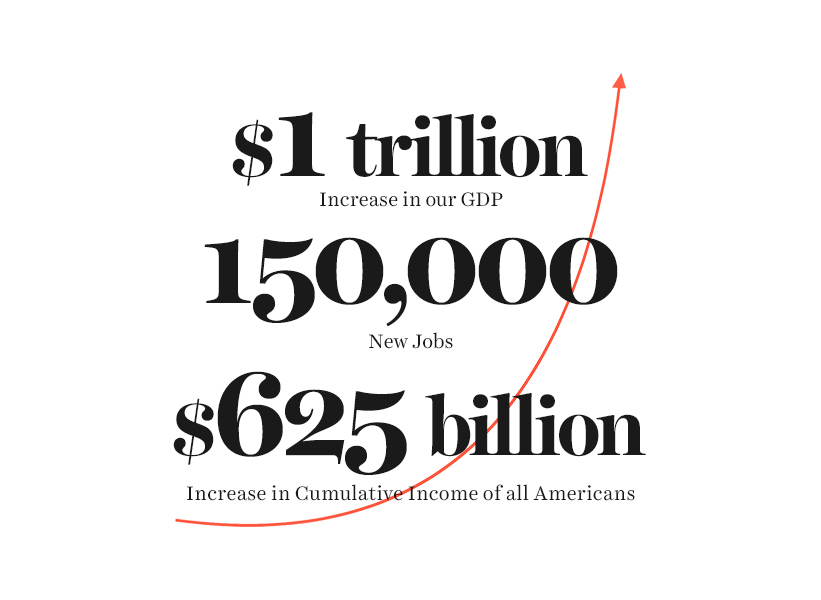
The Case for Immigration Reform
Immigration
Posted May 2017
Migration is a timeless and fundamental human activity, as natural and inevitable as the ocean’s tides. Whether it is flight from peril, pursuit of opportunity, or a combination of the two, migration is a constant throughout human existence. And from America’s inception, one of its greatest strengths has been its willingness to embrace this human impulse and to see the potential and vitality of this human current.
Closed societies are like closed ecosystems. Over time the insularity becomes toxic because they lack the resources to successfully adapt. Immigration is a constant source of growth and regeneration in America’s ecosystem. Individuals moved by the spirit of opportunity have always prevented the calcification of our social, economic, and cultural structures.
When we block that current from flowing, we stagnate and prevent individuals from realizing their potential. When barriers to progress are institutionalized, we diminish the distinctive feature of America’s identity that immigration provides.
Unfortunately, many of our policies for managing immigration are outdated and counterproductive and have left the country with a highly dysfunctional system. Rather than helping steer the nation forward and seizing the opportunities represented by immigration, our current policies are creating unnecessary challenges and preventing progress.
We believe that the status quo in which millions of individuals and families live in constant fear of deportation is intolerable. We believe that the pervasive emotional and psychological harm that results from a life of fear undermines success in our schools, fairness in our workplaces, and the integrity of our democracy.
Our belief is that a functional immigration system that respects the dignity of all people, promotes family unity, and stabilizes communities will grow the economy, reduce inequality, increase opportunity for all Americans, and enrich our democracy.

Ellis Island at the turn of the twentieth century represents our collective willingness to embrace the human impulse to improve one's life and create better opportunities for one's children. Jose's story is also emblematic. Because of his undocumented status, his degree in mechanical engineering went untapped for years. Now as a result of the Deferred Action for Childhood Arrivals legislation, Jose is a master math instructor, who, every day, improves the lives of similarly disenfranchised students.
We believe that immigration reform that enables the 11+ million undocumented immigrants to earn legal status and citizenship is essential to a healthy, vibrant democracy. It will enable millions of workers to realize their full economic potential which in turn will grow our economy and improve the economic condition of all Americans.
While Congressional inaction perpetuates the status quo, other policy makers are taking steps to expand opportunity by adopting policies of inclusion. States are making driver’s licenses available to undocumented residents and enabling undocumented youth to qualify for in-state tuition. Cities are issuing registration cards to their residents and rejecting efforts to make them an extension of the immigration enforcement bureaucracy.
For those who wonder if these policies make a difference, one need only look to the Deferred Action for Childhood Arrivals (DACA) policy, which enabled undocumented immigrants who were brought here as children to request a temporary reprieve from deportation and work authorization. More than 700,000 young immigrants received DACA status, and their experiences offer a compelling set of positive proof points. According to a recent survey of DACA recipients, almost 90% of them were able to get driver’s licenses for the first time; over 90% were able to pursue educational opportunities they couldn’t before they received DACA; and their wages increased by 45%. These were not marginal improvements, but major developments that will have reverberating effects that enhance all of our communities. With the termination of DACA, the future of this group is uncertain.

While the federal dysfunction continues and some states are doubling down on punitive, anti-immigrant policies and practices, individuals and organizations across the country are stepping up to provide legal, health, social, and educational support services.
America’s immigrant identity is too strong to let the recent tilt toward insularity redefine us. A course correction by Congress will once again make policies of inclusion the norm. The question is only when, not if, and how much damage to individuals and families results in the interim.
Take Action
Right now, hundreds of thousands of young immigrants are at risk of losing work permits and protection from deportation. With the bipartisan Dream Act, this group would be able to continue to live and work in the United States.
Call your member of Congress and urge them to pass the Dream Act now.
Connected Stories
-

Hard Decisions: Migration’s Complex Calculus
Immigration -

Family Portrait: José Rafael Patiño
In 2021 in America, this is what a family looks like. Meet José Patiño, a Dreamer from a mixed-status family in Arizona.
Immigration -

What You Need to Know About Pathways to Citizenship in Congress Right Now
On his first day in office, President Biden announced the US Citizenship Act, which would overhaul our immigration system and create a path to citizenship for most undocumented immigrants.
Immigration
